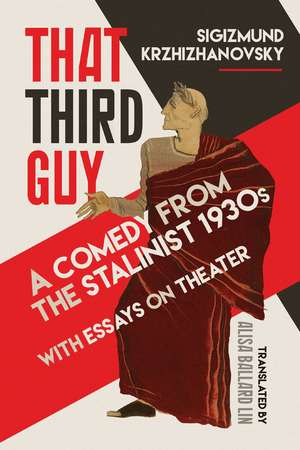That Third Guy: A Comedy from the Stalinist 1930s with Essays on Theater
Autor Sigizmund Krzhizhanovsky Traducere de Alisa Lin Cuvânt înainte de Caryl Emersonen Limba Engleză Hardback – 6 aug 2018
This collection of theater writings by the Russian modernist Sigizmund Krzhizhanovsky brings his powerful, wildly imaginative vision of theater to an English-language audience for the first time. The centerpiece is his play That Third Guy (1937), a farce written at the onset of the Stalinist Terror and never performed. Its plot builds on Alexander Pushkin's poem "Cleopatra," while parodying the themes of Eros and empire in the Cleopatra tales of two writers Krzhizhanovsky adored: Shakespeare and George Bernard Shaw. In a chilling echo of the Soviet 1930s, Rome here is a police state, and the Third Guy (a very bad poet) finds himself in its dragnet. As he scrambles to escape his fate, the end of the Roman Republic thunders on offstage.
The volume also features selections from Krzhizhanovsky's compelling and idiosyncratic essays on Shakespeare, Pushkin, Shaw, and the philosophy of theater. Professionally, he worked with director Alexander Tairov at the Moscow Kamerny Theater, and his original philosophy of the stage bears comparison with the great theater theorists of the twentieth century. In these writings, he reflects on the space and time of the theater, the resonance of language onstage, the experience of the actor, and the relationship between the theater and the everyday. Commentary by Alisa Ballard Lin and Caryl Emerson contextualizes Krzhizhanovsky's writings.
The volume also features selections from Krzhizhanovsky's compelling and idiosyncratic essays on Shakespeare, Pushkin, Shaw, and the philosophy of theater. Professionally, he worked with director Alexander Tairov at the Moscow Kamerny Theater, and his original philosophy of the stage bears comparison with the great theater theorists of the twentieth century. In these writings, he reflects on the space and time of the theater, the resonance of language onstage, the experience of the actor, and the relationship between the theater and the everyday. Commentary by Alisa Ballard Lin and Caryl Emerson contextualizes Krzhizhanovsky's writings.
Preț: 476.53 lei
Preț vechi: 618.87 lei
-23% Nou
Puncte Express: 715
Preț estimativ în valută:
91.19€ • 99.02$ • 76.60£
91.19€ • 99.02$ • 76.60£
Carte tipărită la comandă
Livrare economică 23 aprilie-07 mai
Livrare express 18-22 martie pentru 91.76 lei
Preluare comenzi: 021 569.72.76
Specificații
ISBN-13: 9780299317102
ISBN-10: 0299317102
Pagini: 328
Ilustrații: 10 b-w illus.
Dimensiuni: 152 x 229 x 23 mm
Greutate: 0.56 kg
Editura: University of Wisconsin Press
Colecția University of Wisconsin Press
ISBN-10: 0299317102
Pagini: 328
Ilustrații: 10 b-w illus.
Dimensiuni: 152 x 229 x 23 mm
Greutate: 0.56 kg
Editura: University of Wisconsin Press
Colecția University of Wisconsin Press
Recenzii
"This charming volume makes a notable contribution to the growing English-language literature by and about Sigizmund Krzhizhanovsky, one of the rediscovered gems of twentieth-century Russian literature." —Thomas Seifrid, author of The Word Made Self
Notă biografică
Sigizmund Krzhizhanovsky (1887–1950) was a Russian writer of Polish heritage who lived in Moscow. His short stories, largely unacceptable to Soviet censorship, began to appear in 1989, and many are now available in English. Alisa Ballard Lin is an assistant professor in the Department of Slavic and East European Languages and Cultures at the Ohio State University.
Cuprins
List of Illustrations
Foreword by Caryl Emerson
Biographical Note
Acknowledgments
Introduction: Krzhizhanovsky and Theatrical Modernism
Alisa Ballard Lin
Part I: Krzhizhanovsky on Theater A Philosopheme for the Theater (1923)
Articles for 7 Days of the M.K.T.
Shoring Up (1923)
The Moscow Kamerny Theater and Its Theme (1924)
Pageant (Theater-Cart) (1924)
Man vs. Machine (1924)
At a Crossroads (1924)
The Stage Direction (A Fragment), selections (1937)
Part II: That Third Guy
That Third Guy: A Comedy (1937)
Thirdness in the Theaters of Art and Life
Alisa Ballard Lin
Part III: Krzhizhanovsky on Shaw and Shakespeare
The Dramatic Devices of Bernard Shaw, selections (1934)
Shakespeare’s Comediography (1934)
The Poetics of Shakespeare’s Chronicles, selections (1935)
Imagined Shakespeare (1937)
Fragments on Shakespeare, selections (1939)
Part IV: Krzhizhanovsky on Pushkin
Krzhizhanovsky’s Collapsed Contributions to the Pushkin Jubilee
Caryl Emerson
The Art of the Epigraph (Pushkin), selections (1936)
Stanza by Stanza through Onegin, selections (1936)
A Story of One Manuscript (Boris Godunov) (1937)
Appendix: “Cleopatra” (1828 variant) by Alexander Pushkin
Index
Foreword by Caryl Emerson
Biographical Note
Acknowledgments
Introduction: Krzhizhanovsky and Theatrical Modernism
Alisa Ballard Lin
Part I: Krzhizhanovsky on Theater A Philosopheme for the Theater (1923)
Articles for 7 Days of the M.K.T.
Shoring Up (1923)
The Moscow Kamerny Theater and Its Theme (1924)
Pageant (Theater-Cart) (1924)
Man vs. Machine (1924)
At a Crossroads (1924)
The Stage Direction (A Fragment), selections (1937)
Part II: That Third Guy
That Third Guy: A Comedy (1937)
Thirdness in the Theaters of Art and Life
Alisa Ballard Lin
Part III: Krzhizhanovsky on Shaw and Shakespeare
The Dramatic Devices of Bernard Shaw, selections (1934)
Shakespeare’s Comediography (1934)
The Poetics of Shakespeare’s Chronicles, selections (1935)
Imagined Shakespeare (1937)
Fragments on Shakespeare, selections (1939)
Part IV: Krzhizhanovsky on Pushkin
Krzhizhanovsky’s Collapsed Contributions to the Pushkin Jubilee
Caryl Emerson
The Art of the Epigraph (Pushkin), selections (1936)
Stanza by Stanza through Onegin, selections (1936)
A Story of One Manuscript (Boris Godunov) (1937)
Appendix: “Cleopatra” (1828 variant) by Alexander Pushkin
Index
Descriere
The first English translation of Krzhizhanovsky's modernist essays on theater and of his play That Third Guy, a farce written at the onset of the Stalinist Terror. The plot builds on Alexander Pushkin's poem "Cleopatra," while parodying the themes of Eros and empire in the Cleopatra tales of Shakespeare and George Bernard Shaw.
